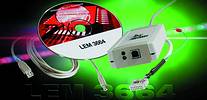Development and on-chip debut package for Hitachi's Tiny series
17 July 2002
DSP, Micros & Memory

Hitachi's LEM3664 emulation module is the first in a series of development tools supporting the company's H8/300H Tiny series E10T on-chip debug interface. The module provides a complete set of tools for this family of microcontrollers, including a fully functional version of the Tiny series C compiler.
LEM3664 incorporates a USB interface and cable, a target connector and an on-board 16 MHz H8/3664H microcontroller, providing EVB-like facilities. It has three modes of operation: standalone EVB mode; E10T mode, using the target connector; and emulator mode, using a built in mini-dip header or external QFP header.
The E10T debug interface supports a high-speed serial link between the microcontroller and LEM3664. Each Tiny series microcontroller also has an on-chip breakpoint controller and trace buffer which allow applications to be downloaded to the flash memory and debugged in the users target application.
The LEM3664 module supports the Hitachi Debug Interface (HDI), a Windows-based source level debugger, allowing applications to be debugged at both C and assembly level. HDI allows access to LEM3664 features, including C watch points, C and instruction level trace, breakpoints and flash programming, using Windows 98 or 2000. The emulation module also comes with a full C compiler for the Tiny Series and the Hitachi Embedded Workshop (HEW) development enviroment.
Software upgrades will extend the support of the emulation module to other members of the Tiny series family including H8/3672F, H8/3687F and H8/3694F microcontrollers.
For more information: Avnet Kopp, 011 809 1600, [email protected], www.avnet.co.za
Further reading:
Memory for asset tracking
Altron Arrow
DSP, Micros & Memory
The Page EEPROM, ST’s latest memory, has been designed for efficient datalogging and fast firmware upload/download in battery-operated devices.
Read more...
Engineered for high-reliability applications
Future Electronics
DSP, Micros & Memory
The MCX E series of Arm Cortex-M4F and Arm Cortex-M7 microcontrollers from NXP are engineered for demanding industrial and IoT environments.
Read more...
NXP’s development platform guide
DSP, Micros & Memory
Choosing between the FRDM i.MX 93, FRDM i.MX 91 and FRDM i.MX 91S development platforms can be intimidating, but once designers understand how each platform aligns with their application’s requirements, the decision becomes straightforward.
Read more...
XJTAG launches two new Flash programmers
ASIC Design Services
DSP, Micros & Memory
XJTAG has announced XJExpress and XJExpress-FPGA, a pair of Flash programmers perfect for development, debug and in-service applications.
Read more...
Processor offers competitive solution for advanced HMIs
Future Electronics
DSP, Micros & Memory
The new RZ/A3M microprocessor from Renesas features 128 Mbytes of fast DDR3L DRAM memory for system cost reduction, and supports
1280 x 800 px video resolution at a rate of 30 frames/s.
Read more...
ESP32-C6 achieves PSA-L2
iCorp Technologies
DSP, Micros & Memory
Espressif Systems recently announced that its ESP32-C6 microcontroller has achieved PSA Certified Level 2 (PSA-L2) security certification, making it the first RISC-V-based MCU to reach this level.
Read more...
Microprocessor with integrated NPU
Avnet Silica
DSP, Micros & Memory
The RZ/G3E from Renesas is a microprocessor integrated with quad CPU and NPU in one chip, improving power efficiency, reliability, and security.
Read more...
Nordic Semiconductor launches nRF Connect SDK Bare Metal option for nRF54L series
Avnet Silica
DSP, Micros & Memory
This is a new, RTOS-independent software solution for Bluetooth LE development, designed to ease developers’ migration from the legacy nRF5 SDK and nRF52 series to the next-generation nRF54L series.
Read more...
Dual-core support in NECTO Studio
DSP, Micros & Memory
MIKROE recently announced that version 7.3.0 of its NECTO Studio Integrated Development Environment now supports dual-core MCUs, allowing designers to program and debug each core independently.
Read more...
Post Quantum Cryptographic firmware library
DSP, Micros & Memory
The STM32 post-quantum cryptographic library enables developers to satisfy application requirements for any combination of data integrity, confidentiality, identification/authentication, and nonrepudiation.
Read more...


